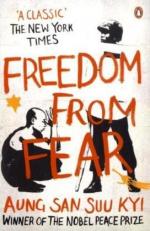
|
| Name: _________________________ | Period: ___________________ |
This quiz consists of 5 multiple choice and 5 short answer questions through Part 2: Section 7.
Multiple Choice Questions
1. What was the Burmese peoples' general attitude toward the British?
(a) Generally inviting.
(b) Basically curious.
(c) Largely indifferent.
(d) Very hostile.
2. Who influenced the Burmese in terms of philosophy?
(a) The Greeks.
(b) The Chinese.
(c) The Indians.
(d) The Persians.
3. According to Aung San Suu Kyi, what are the Burmese people eager to study?
(a) Modern politics.
(b) History.
(c) Economics.
(d) Philosophy.
4. In terms of outsiders, who represented a bigger change than the British?
(a) The Indians and Chinese.
(b) The Americans and the Canadians.
(c) The Portuguese and the Dutch.
(d) The Japanese and the Koreans.
5. What group was at the core of the Burma Independence Army (BIA)?
(a) The Rangoon Seven.
(b) The Thirty Comrades.
(c) The Gang of Four.
(d) The Twelve Angry Men.
Short Answer Questions
1. In 1988 in Burma, what gave hope to the process of decline?
2. Which is not a Burmese ethnic group?
3. What is the main river in Burma?
4. Which is NOT a cause of decay according to the Buddhists?
5. Who have taken on their traditional role as mentors?
|
This section contains 218 words (approx. 1 page at 300 words per page) |

|




